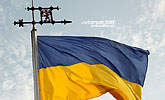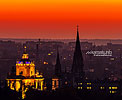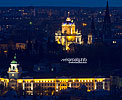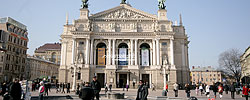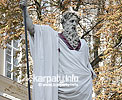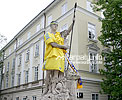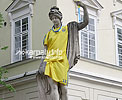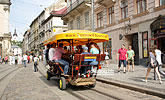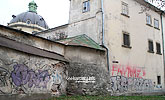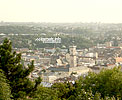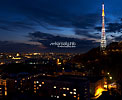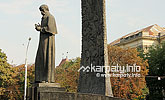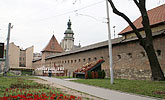To leave Lviv, to come back to Lviv, to be impressed by Lviv,
To lose your way in Lviv, to fall in love with Lviv, to die near Lviv,
To scream before death — hey Lviv, I'm still alive!
Yurko Izdryk
Why Lviv actually? Each person, who chooses our city, asks themselves this particular question. There is one question, but lots of answers. And also there are lots of events, impressions and emotions for anybody who comes there at first as well as for everyone who chooses Lviv as a city to live in.
Whenever and however you come to Lviv, you will for sure get a kaleidoscope of events and impressions, which is provided by city inhabitants, and you will also obtain mystical, enigmatic atmosphere of the streets and nooks. Among its neighbours in Central and Eastern Europe, Lviv remains a city where you can still see the past, but the future is already well visible. Almost everyone, who has already visited the city, claims about its peculiar SOUL.
It is a miracle indeed. It is worth to recall the fact that some 20-30 years ago this pearl of the European civilization, which is only 80 km far from the European Union's border, was closed for foreigners. Because of that, it was much more habitually to hear Where is Lviv? instead of Why Lviv? The Empire times have passed already, but there still exists a talk from the XX century, which tells, when trains from Paris and Moscow arrive at Lviv railway station, their passengers sigh, looking out of their windows. "Finally I'm in the East", a Frenchman says. "Well, I am in the West", Russian claims.
This is exactly the chief business card of Lviv — the city of big discoveries and immense chances, the sweet fragrances of the mystique East and sounds of the romantic West are interlaced there with the expressiveness of the South and the phlegmatic peace of the North. It was exactly in this way that the poet and wanderer Sebastyan Klonovych wrote in his memories about Lviv, where he said: "It seems that all treasures of the world are brought into this frontier city by the sledges of the north and by the ships of the ocean".
Remembering times of the Ukrainian princes, Polish kings, Austrian monarches and Soviet rulers, people in Lviv still speak different languages, pray in various temples and vividly discuss politics in the city centre. At the same time, all inhabitants together like to execute the mysterious ritual together, which is called 'to go out for a cup of coffee', they also root for and play football, and when deep autumn comes, they complain about the weather. Thus, while staying in Lviv you will not get rid of the feeling, that over there, round the next building's corner, there will finally be a surprise, which you can only compare with the discovery of the New World.
770 years of official history left vestigial traces over the architectural visage of Lviv. You will meet all famous architectural styles and trends. In this city-museum there are several hundreds of fantastic stone buildings in the open air, and it enjoys to impress people. History and contemporaneity really continue to live there, and office buildings have not managed to supplant ordinary people yet, who actually make the city alive. Here you can hear authentic sounds, melodies and even odours. Everything is alive and real there. Having made less than hundred steps, like in distant Jerusalem, you will get from Armenian district to Catholic one, from there to Orthodox district and finally into the mysterious microworld of the Jewish street. Three Christian centres of the Empire — Orthodox, Catholic and Armenian already for 7 centuries have been calling the believers to pray daily by the sound of the bells from the top of the temples. Devotion of the inhabitants incites to tolerance and to efforts to understand another culture.
Besides, the city yielded the world a great amount of famous inventions and well-known persons. There the first kerosene lamp and hockey mask appeared; the internationl racings on the road with a tram rut were held, the first successful stomach ulcer surgical operation was conducted. And where, if not in Lviv, could Leopold von Sacher Masoch be born, from whose literary works doctors created the term of masochism.
About everythig you will be told in the excursional free pass tram, or in the market, or in a cafè, or finally in the street. That is because the citizens of Lviv are in love with its history, as it is a part of their everyday lives. Residents really like to search for answers in the past about the present time and to be upset about such things as: around the city they can not see so many fur hats of Jewish people anymore, they hear less Polish language and they can not see caravans of the merchants from the East on the horizon. Unfortunatelly, wars and political disorders of the ХХ century were much more kind to the city architecture than to the city inhabitants. Just to preserve the remains of the Lviv city unique atmosphere for its offsprings, in 1999 the city was accepted to the list of the UNESCO world cultural heritage.
But the city is not only proud of its architectural wealth. If you wish to see and feel the traditional country life culture of the Western Ukraine inhabitants, it is not necessary to go far away from Lviv. You just have to visit the People's Museum of Architecture, Manners and Customs. Here, almost in the city centre, you can have a look at the manners and customs of such ethnic groups as boyky, hutsuls and lemky. There are old huts, churches, a school and even a mini zoo. In spite of the urban world temptations, the culture of the Ukrainian city lives there right in the streets. It is easy to notice it not just in traditional embroidered shirts of the local residents, but also in some remarks of taxi drivers, in gossips of pedlars, in waiters' smiles or even in policemen' looks. Citizens of Lviv love their city and they enjoy themselves in it. That is why they want to share the happiness of living in Lviv with everyone.
Lviv dwellers really take care of their look. And not just during life, but also after death. The city necropolis — Lychakiv is nice at any weather. Forty hectares of the territory, over three thousands of buryings and… hundreds, thousands of bizarre tombstones. Where else can you find a place where history is so close to us? It is said that the cemetery in Lviv has just one analogue in Europe — a famous graveyard Pere Lachaise in Paris. The Ukrainians and the Poles, the Jews and the Germans, the Austrians and the Russians — all of them got the eternal peace in this soil. And it is quite often that in Lychakiv cemetery those people, who were bitterest enemies during life, were buried next to each other.
Lviv also cares about its future. It is a perfect place to study at. Nowadays, in the city there are such famous and competent in the whole world educational establishments as: National University of Ivan Franko, Lviv Polytechnic University, Lviv Medical University of Danylo Halytsky, Lviv Academy of Arts, Army Institute etc. Every day almost 120 thousand of young people get their degree in this city, the bigger part of them are foreigners. A great amount of politics and public figures of Ukraine studied in Lviv in the past or were in contact with Lviv city. When they depart, they are proud that maybe the best part of their lives has passed there. In all continents there are people, who will always remember about Lviv and the time spent there.
Lviv is a nice spot to have rest. Nice environmental conditions, big parks, closeness to the Carpathian mountains, old castles remains about hundred kilometres far — everything makes the city attractive for those who search for peace from modern world's fuss, who seek for solitude and sentimental journeys. But if you are fond of active recreation, you can hardly find so many stylish coffee houses, night clubs, theatres, museums, art galleries and exhibitions anywhere else in Ukraine as in Lviv city. Try to enjoy your life in Lviv style and you will not regret it!
And finally. Walking above the underground Poltva river's overarch around Svoboda Avenue, you will reach the famous Opera House, and from there you will get the High Castle mountain. There, standing on the former princely town and looking at old Lviv city from the bird's eye view, you will finally understand why numerous amount of city guests call this city the small Vienna, Prague or Florence, instead Lviv residents modestly wish to call their city the Big Lviv.

 Ukraine
Ukraine Poland
Poland Slovakia
Slovakia
 Українською
Українською